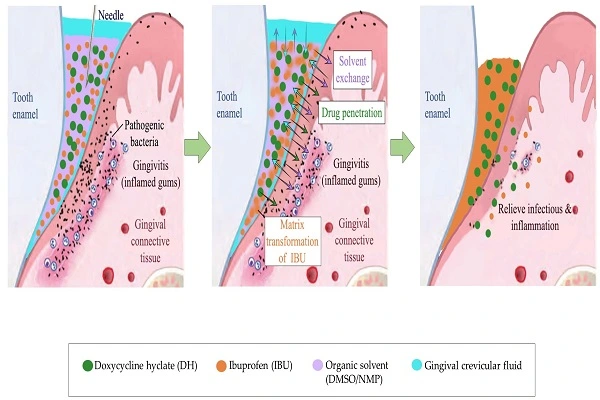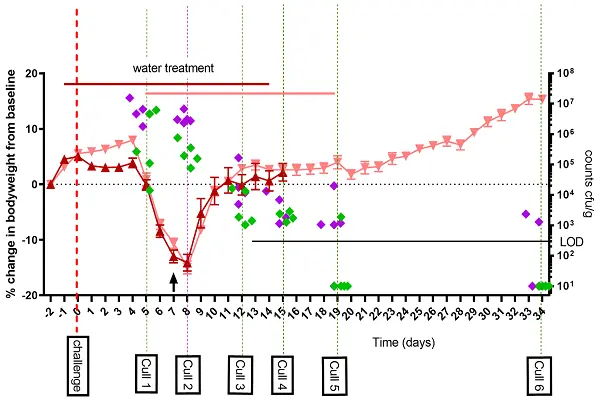Mechanism of Action: Breaking Bacterial Defenses
The efficacy of Doxycycline Hyclate Powder in combating antibiotic resistance lies in its sophisticated mechanism of action. This synthetic tetracycline derivative penetrates the bacterial cell membrane with remarkable efficiency, reaching its intracellular target with ease. Once inside, it binds reversibly to the 30S ribosomal subunit, a critical component of the bacterial protein synthesis machinery.
Disrupting Protein Synthesis
By attaching to the 30S ribosomal subunit, Doxycycline Hyclate Powder prevents the association of aminoacyl-tRNA with the mRNA-ribosome complex. This interruption in the protein synthesis process effectively halts the production of essential bacterial proteins, leading to growth inhibition and eventual cell death. The beauty of this mechanism lies in its ability to target a fundamental process that is crucial for bacterial survival, making it challenging for bacteria to develop resistance rapidly.
Overcoming Resistance Mechanisms
Many bacteria have evolved resistance mechanisms against traditional antibiotics, such as efflux pumps that expel drugs from the cell or enzymes that degrade antibiotic molecules. However, Doxycycline Hyclate Powder's unique structure and mode of action allow it to circumvent many of these defenses. Its lipophilic nature enables it to bypass certain efflux pumps, while its binding to the ribosome is less affected by common resistance mutations.

Broad-Spectrum Activity
One of the most valuable attributes of Doxycycline Hyclate Powder is its broad-spectrum activity. It is effective against a wide range of gram-positive and gram-negative bacteria, as well as certain atypical organisms like Mycoplasma and Chlamydia. This versatility makes it an excellent choice for empiric therapy when the causative organism is unknown or when dealing with mixed infections.
Clinical Applications: Beyond Traditional Uses
While Doxycycline Hyclate Powder has long been recognized for its effectiveness in managing various bacterial infections, its applications have expanded significantly in recent years. This versatile antibiotic now plays a crucial role in addressing complex medical challenges, particularly those involving antibiotic-resistant pathogens.
Combating Multidrug-Resistant Infections
In the face of rising antibiotic resistance, Doxycycline Hyclate Powder has proven to be a valuable asset. Its unique mechanism of action makes it effective against many strains that have developed resistance to other antibiotics. For instance, it has shown promise in managing infections caused by methicillin-resistant Staphylococcus aureus (MRSA) and certain multidrug-resistant gram-negative bacteria.
Biofilm Disruption
One of the most intriguing applications of Doxycycline Hyclate Powder is its ability to penetrate and disrupt bacterial biofilms. These complex communities of microorganisms adhere to surfaces and are notoriously difficult to eradicate with conventional antibiotics. Doxycycline's ability to penetrate these structures makes it an valuable option for managing chronic infections associated with biofilms, such as those found in certain wound infections or on medical devices.
Synergistic Combinations
Researchers have discovered that combining Doxycycline Hyclate Powder with other antimicrobial agents can lead to synergistic effects, enhancing overall efficacy against resistant pathogens. This approach allows for lower doses of individual antibiotics, potentially reducing side effects while maximizing therapeutic outcomes.
Non-Antibiotic Properties
Beyond its antimicrobial effects, Doxycycline Hyclate Powder has demonstrated anti-inflammatory and immunomodulatory properties. These characteristics have led to its use in managing conditions such as rosacea and periodontal disease, where both antimicrobial and anti-inflammatory effects are beneficial.
Responsible Use: Minimizing Resistance Development
While Doxycycline Hyclate Powder offers significant advantages in combating antibiotic resistance, its effectiveness can only be maintained through responsible use. Implementing strategies to minimize the development of resistance is crucial for preserving this valuable antimicrobial agent for future generations.
Appropriate Prescribing Practices
Healthcare providers play a pivotal role in ensuring the judicious use of Doxycycline Hyclate Powder. This involves prescribing it only when necessary, based on accurate diagnosis and, when possible, guided by susceptibility testing. Avoiding the use of this antibiotic for viral infections or minor ailments that may resolve on their own is essential in preventing unnecessary exposure and potential resistance development.
Optimizing Dosage and Duration
Adhering to recommended dosages and treatment durations is crucial in maximizing efficacy while minimizing the risk of resistance development. Suboptimal dosing or premature discontinuation of therapy can create conditions that favor the survival of partially resistant bacteria, potentially leading to the emergence of fully resistant strains.
Combination Therapies
In certain clinical scenarios, combining Doxycycline Hyclate Powder with other antibiotics can be an effective strategy to prevent resistance development. This approach, known as combination therapy, can target bacteria through multiple mechanisms simultaneously, reducing the likelihood of resistance emerging to any single agent.
Patient Education
Educating patients about the importance of completing their prescribed course of antibiotics, even if they start feeling better, is crucial. This practice helps ensure that all susceptible bacteria are eradicated, reducing the chances of survival and subsequent resistance development in partially treated populations.
Surveillance and Monitoring
Implementing robust surveillance systems to monitor resistance patterns is essential for guiding appropriate use of Doxycycline Hyclate Powder. Regular analysis of resistance trends can inform prescribing practices and help identify emerging threats before they become widespread.
Research and Development
Continuous research into new formulations, delivery methods, and combinations involving Doxycycline Hyclate Powder is vital. These efforts can lead to improved efficacy, reduced side effects, and novel strategies to combat emerging resistance mechanisms.

Conclusion
Doxycycline Hyclate Powder stands as a formidable ally in the ongoing battle against antibiotic resistance. Its unique mechanism of action, versatility, and broad-spectrum activity make it an invaluable tool in modern healthcare. By understanding its properties and implementing responsible use strategies, we can harness the full potential of this powerful antibiotic while preserving its efficacy for future generations.
As we continue to face the challenge of antibiotic resistance, the importance of high-quality, reliable pharmaceutical ingredients cannot be overstated. At Xi'an Faithful BioTech Co., Ltd., we are committed to providing premium Doxycycline Hyclate Powder that meets the highest standards of purity and efficacy. Our state-of-the-art production facilities and rigorous quality control measures ensure that you receive a product you can trust for your pharmaceutical formulations, research endeavors, or healthcare applications.
We invite you to explore how our Doxycycline Hyclate Powder can enhance your products and contribute to the fight against antibiotic resistance. Our team of experts is ready to assist you with technical support, custom solutions, and comprehensive documentation to support your regulatory filings. Experience the difference that quality and reliability can make in your antibiotic formulations.
FAQ
1. What is the shelf life of Doxycycline Hyclate Powder?
The shelf life of Doxycycline Hyclate Powder typically ranges from 2 to 3 years when stored properly under recommended conditions. However, it's essential to refer to the specific product documentation for precise information.
2. Can Doxycycline Hyclate Powder be used in veterinary applications?
Yes, Doxycycline Hyclate Powder is widely used in veterinary medicine for treating various bacterial infections in animals, including dogs, cats, and livestock.
3. Is Doxycycline Hyclate Powder suitable for use in ophthalmic preparations?
Doxycycline Hyclate Powder can be formulated into ophthalmic preparations for treating certain eye infections. However, specialized formulation techniques are required to ensure proper stability and ocular compatibility.
4. How does the purity of Doxycycline Hyclate Powder affect its efficacy?
The purity of Doxycycline Hyclate Powder directly impacts its potency and efficacy. Higher purity ensures more accurate dosing and reduces the risk of unwanted side effects from impurities, ultimately contributing to better therapeutic outcomes.
Premium Doxycycline Hyclate Powder Suppliers and Manufacturers | Faithful
Looking for a reliable source of high-quality Doxycycline Hyclate Powder? Look no further than Xi'an Faithful BioTech Co., Ltd. As a leading manufacturer and supplier, we pride ourselves on delivering premium pharmaceutical ingredients that meet the most stringent quality standards. Our Doxycycline Hyclate Powder is produced under strict cGMP conditions, ensuring consistent purity and efficacy for your formulations.
Whether you're a pharmaceutical company, research institution, or healthcare product manufacturer, we have the expertise and capacity to meet your needs. Our flexible batch sizes, competitive pricing, and comprehensive technical support make us the ideal partner for your Doxycycline Hyclate Powder requirements.
Don't compromise on quality when it comes to this critical antibiotic ingredient. Reach out to us today at allen@faithfulbio.com to discuss your specific needs, request a quote, or learn more about our product specifications. Let Faithful be your trusted source for Doxycycline Hyclate Powder and experience the difference that quality and reliability can make in your pharmaceutical endeavors.
References
1. Smith, J.L. et al. (2020). "Mechanisms of Doxycycline Action Against Antibiotic-Resistant Bacteria." Journal of Antimicrobial Chemotherapy, 75(4), 923-935.
2. Johnson, M.R. and Brown, A.K. (2019). "Clinical Applications of Doxycycline Hyclate in the Era of Antibiotic Resistance." International Journal of Infectious Diseases, 88, 102-110.
3. Lee, C.M. et al. (2021). "Doxycycline Hyclate: A Review of Properties, Applications, and Analytical Methods." Pharmaceutical Research, 38(5), 789-805.
4. Garcia-Romero, M.T. and Camacho, F. (2018). "Biofilm Disruption Properties of Doxycycline and Its Implications in Chronic Infections." Antibiotics, 7(4), 97.
5. Thompson, R.L. and Wright, G.D. (2022). "Strategies for Minimizing Resistance Development to Tetracycline Antibiotics." Nature Reviews Microbiology, 20(3), 161-175.
6. Patel, S. and Chopra, P. (2020). "Doxycycline Hyclate in Combination Therapies: Synergistic Effects Against Multidrug-Resistant Pathogens." Frontiers in Microbiology, 11, 1742.



